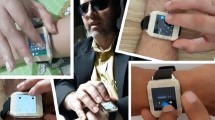Abstract
The goal of the MOST project is to develop a novel, inexpensive, easy-to-use digital talking device for blind and visually impaired users based on off-the-shelf handheld computers (Personal Digital Assistant). The device provides a novel user interface based on a simple menu system and Braille text input, and a range of application programs to support everyday tasks, including clock, notepad, phone and short messaging, email. This paper reports on the usability evaluation of the device, its strategy and implementation, and shows that our approach results in an easy to learn and use system with input speed comparable to sighted users.
Preview
Unable to display preview. Download preview PDF.
Similar content being viewed by others
References
Arato, A., Juhasz, Z., Blenkhorn, P., Evans, G., Evreinov, G.: Java-powered Braille slate talker. In: Miesenberger, K., Klaus, J., Zagler, W., Burger, D. (eds.) ICCHP 2004. LNCS, vol. 3118, pp. 506–513. Springer, Heidelberg (2004)
Freedom Scientific Inc.: PAC Mate BNS (2004), http://www.freedomscientific.com/fs_products/PACmate_bns.asp
Technologies HumanWare Canada Inc.: Maestro PDA (2005) , http://humanware.ca/web/en/p_DA_Maestro.asp
log4j project: http://logging.apache.org/log4j/docs/
Hungarian Electronic Library: http://vmek.oszk.hu/
Author information
Authors and Affiliations
Editor information
Editors and Affiliations
Rights and permissions
Copyright information
© 2006 Springer-Verlag Berlin Heidelberg
About this paper
Cite this paper
Juhasz, Z. et al. (2006). Usability Evaluation of the MOST Mobile Assistant (SlatTalker). In: Miesenberger, K., Klaus, J., Zagler, W.L., Karshmer, A.I. (eds) Computers Helping People with Special Needs. ICCHP 2006. Lecture Notes in Computer Science, vol 4061. Springer, Berlin, Heidelberg. https://doi.org/10.1007/11788713_154
Download citation
DOI: https://doi.org/10.1007/11788713_154
Publisher Name: Springer, Berlin, Heidelberg
Print ISBN: 978-3-540-36020-9
Online ISBN: 978-3-540-36021-6
eBook Packages: Computer ScienceComputer Science (R0)




